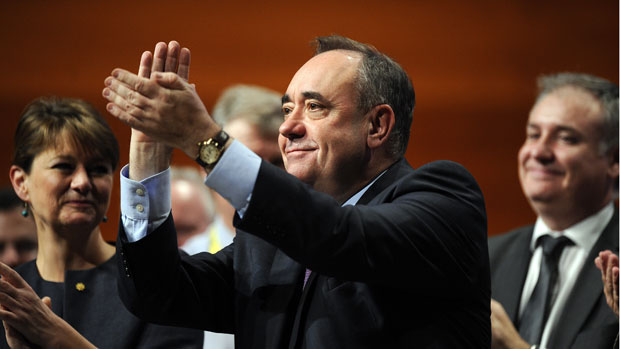Salmond threatens to block a Tory minority government
Former SNP leader says the party would come out against the Conservatives in a vote of confidence

A free daily email with the biggest news stories of the day – and the best features from TheWeek.com
You are now subscribed
Your newsletter sign-up was successful
Alex Salmond, the former SNP leader and a prospective MP, has warned that his party will try to block a minority Conservative government if it holds the post-election balance of power.
Salmond, who stood down as party leader after narrowly losing the bid for Scottish independence last year, is hoping to become a Westminster MP in May and believes the SNP could "hold the power" in a hung parliament.
He told the New Statesman that the Tories would have to go for a vote of confidence, usually the Queen's Speech, but said "it could be otherwise, of course, and we'd be voting against". He added: "So if Labour joins us in that pledge, then that's Cameron locked out."
The Week
Escape your echo chamber. Get the facts behind the news, plus analysis from multiple perspectives.

Sign up for The Week's Free Newsletters
From our morning news briefing to a weekly Good News Newsletter, get the best of The Week delivered directly to your inbox.
From our morning news briefing to a weekly Good News Newsletter, get the best of The Week delivered directly to your inbox.
There would then be a two-week period to form another government, he said.
The Conservatives accused Salmond of "trying to sabotage the democratic will of the British people", while Labour, which has ruled out a formal coalition with the Scottish nationalists, called his balance of power prediction "bluster and bluff".
Nevertheless, opinion polls suggest the number of SNP seats at Westminster could increase dramatically at the general election.
According to Parliament.uk, the first parliamentary test of a minority or coalition government is the parliamentary vote on an amendment to the Queen's Speech, the government's legislative programme for the session, which is read out by the Queen shortly after the election.
A free daily email with the biggest news stories of the day – and the best features from TheWeek.com
"If the Queen's Speech is amended, the Prime Minister must resign," it says.
However, the New Statesman says that as a result of the Fixed-term Parliaments Act 2011, introduced under Cameron's leadership, a specific motion would also have to be passed stating that the "House has no confidence in Her Majesty’s Government".
SNP leader Nicola Sturgeon will lead any post-election negotiations for the party, but the BBC says Salmond "seems certain to have a role" if he becomes an MP.
Ramsay MacDonald formed the first Labour government in 1924 after the Conservative Party, led by Stanley Baldwin, lost its majority at the general election and then lost a vote on the King's speech.
-
 The ‘ravenous’ demand for Cornish minerals
The ‘ravenous’ demand for Cornish mineralsUnder the Radar Growing need for critical minerals to power tech has intensified ‘appetite’ for lithium, which could be a ‘huge boon’ for local economy
-
 Why are election experts taking Trump’s midterm threats seriously?
Why are election experts taking Trump’s midterm threats seriously?IN THE SPOTLIGHT As the president muses about polling place deployments and a centralized electoral system aimed at one-party control, lawmakers are taking this administration at its word
-
 ‘Restaurateurs have become millionaires’
‘Restaurateurs have become millionaires’Instant Opinion Opinion, comment and editorials of the day
-
 How corrupt is the UK?
How corrupt is the UK?The Explainer Decline in standards ‘risks becoming a defining feature of our political culture’ as Britain falls to lowest ever score on global index
-
 How long can Keir Starmer last as Labour leader?
How long can Keir Starmer last as Labour leader?Today's Big Question Pathway to a coup ‘still unclear’ even as potential challengers begin manoeuvring into position
-
 The high street: Britain’s next political battleground?
The high street: Britain’s next political battleground?In the Spotlight Mass closure of shops and influx of organised crime are fuelling voter anger, and offer an opening for Reform UK
-
 The MAGA civil war takes center stage at the Turning Point USA conference
The MAGA civil war takes center stage at the Turning Point USA conferenceIN THE SPOTLIGHT ‘Americafest 2025’ was a who’s who of right-wing heavyweights eager to settle scores and lay claim to the future of MAGA
-
 Is a Reform-Tory pact becoming more likely?
Is a Reform-Tory pact becoming more likely?Today’s Big Question Nigel Farage’s party is ahead in the polls but still falls well short of a Commons majority, while Conservatives are still losing MPs to Reform
-
 The launch of Your Party: how it could work
The launch of Your Party: how it could workThe Explainer Despite landmark decisions made over the party’s makeup at their first conference, core frustrations are ‘likely to only intensify in the near-future’
-
 What does the fall in net migration mean for the UK?
What does the fall in net migration mean for the UK?Today’s Big Question With Labour and the Tories trying to ‘claim credit’ for lower figures, the ‘underlying picture is far less clear-cut’
-
 Will the public buy Rachel Reeves’s tax rises?
Will the public buy Rachel Reeves’s tax rises?Today’s Big Question The Chancellor refused to rule out tax increases in her televised address, and is set to reverse pledges made in the election manifesto